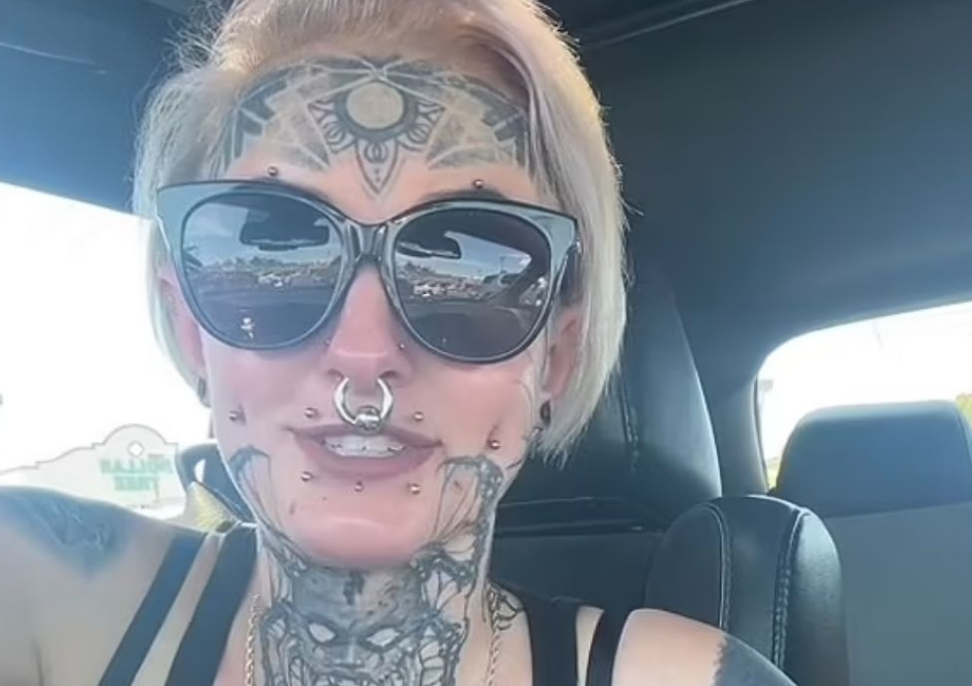They say first impressions are the last impressions, and that age-old adage seems to hold especially true in the professional world. Employers often make snap judgments based on how someone looks, assuming that appearance reflects character or competence. While this might seem superficial, it is an unfortunate reality that many people face every day. And for some, these judgments can have profound consequences on their career opportunities, their confidence, and their sense of self-worth.
One woman has recently sparked a wave of discussion online after sharing her personal struggle with being judged solely on her appearance rather than her skills, experience, or potential. Ash Putnam, a heavily tattooed creator known for her work on OnlyFans, opened up about the challenges she faces trying to secure traditional employment. In her own words, she feels that the world is too quick to dismiss her because of her exterior rather than looking deeper at the person she truly is. Her story has resonated with many people who have faced similar experiences, bringing attention to the ongoing stigma surrounding tattoos, piercings, and alternative forms of self-expression.
Ash explained that she has applied to hundreds of part-time positions at reputable and prestigious establishments, hoping to be given a fair opportunity to contribute and prove herself. Despite her persistence and dedication, she says her applications are often overlooked—or dismissed outright—without so much as a second glance. “It feels like people are making assumptions about who I am and what I’m capable of just by looking at me,” she said. “I’m judged for my tattoos, my piercings, and the way I present myself, instead of being evaluated on my experience, skills, and work ethic.”
For Ash, this isn’t just a minor annoyance—it’s a barrier that prevents her from fully participating in the professional world. The discrimination she encounters is subtle but consistent: she believes employers see her appearance as “too drastic” for traditional workplaces and automatically categorize her as unsuitable. This assumption, she argues, is not only unfair but entirely disconnected from her actual abilities and character.
“So I wanted to come on here and talk about what it is that’s really bothering me,” she said during a recent online post that quickly gained traction. “Just because I have piercings or tattoos doesn’t mean I’m a bad person. It doesn’t make me unreliable, unprofessional, or incapable. I am no different from any other candidate who’s applying for the same roles.”
Her post struck a chord with many people, prompting an outpouring of support from others who have faced similar bias in their own careers. Social media users shared stories of being judged for hair color, clothing, or other forms of personal expression, emphasizing that workplaces often prioritize conformity over talent. The response demonstrates that Ash’s experience is far from unique: many people are still being penalized for choices that have nothing to do with their ability to do a job well.
“My tattoos are the main reason for my rejection,” Ash said bluntly. “Some workplaces are okay with them, sure, but the majority aren’t. Can someone explain to me how having body art makes me a bad worker? How does expressing myself through tattoos diminish my potential, my dedication, or my reliability?”
Her frustration is understandable. Tattoos, once stigmatized as symbols of rebellion or deviance, have become increasingly common and accepted in modern society. Yet, in many professional settings, they remain a taboo subject, particularly in industries that value traditional aesthetics or customer-facing appearances. Ash’s story highlights this tension and raises larger questions about inclusivity, fairness, and the true meaning of professionalism.
Beyond the workplace, Ash’s post is a reminder of the importance of empathy and understanding. People are more than what they look like on the outside, and judging someone solely on appearance ignores the depth, character, and potential that lie beneath the surface. Many of the responses to her story show that people are ready for change and willing to challenge these outdated notions. They express solidarity, saying they too have felt unseen, dismissed, or underestimated because of how they look.
For Ash, the hope is simple: to be given a fair chance. She wants her next opportunity to be based on her abilities, her dedication, and her character—not on whether her tattoos fit a particular image of “acceptable” appearance. In a world that increasingly values individuality and creativity, her message is both timely and powerful: talent, professionalism, and potential are not determined by the ink on your skin.
Her story continues to gain attention, sparking discussions about how society defines professionalism and who gets to decide what’s “acceptable” in the workplace. Ash’s message resonates far beyond her personal struggle—it’s a call to action for employers, colleagues, and society at large to look deeper, evaluate people fairly, and recognize that appearances do not define worth.
